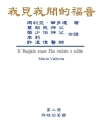George Bethune English’s ‘Letter to the Reverend Mr. Cary’ is a striking literary work that delves into the complexities of religion, morality, and societal norms. Written in the form of a letter, the book explores the inner conflict of the protagonist as he grapples with his faith in the face of personal challenges. English’s meticulous prose and insightful reflections provide readers with a thought-provoking read that invites deep contemplation on the human experience and the nature of spirituality. Set in the early 19th century, the book offers a glimpse into the religious and philosophical debates of the time, shedding light on the cultural milieu of the era. Through the nuanced characterization and poignant narrative, English captivates the reader from start to finish, making ‘Letter to the Reverend Mr. Cary’ a timeless piece of literature that resonates with readers across generations. George Bethune English’s background as a clergyman and scholar undoubtedly influenced the profound themes explored in the book. His intimate knowledge of religious doctrine and philosophical discourse enriches the narrative, making it a compelling and insightful work that lingers in the reader’s mind long after the final page is turned. I highly recommend ‘Letter to the Reverend Mr. Cary’ to readers who appreciate intellectually stimulating literature that challenges conventional beliefs and offers a fresh perspective on timeless questions of faith and moral enlightenment.
Despre autor
George Bethune English (1787-1828) was an American adventurer, diplomat, soldier, and convert to Islam, whose intellectual pursuits and eclectic life experiences were as bold as they were extraordinary. Initially an ordained minister, English’s faith and perspective underwent a profound transition which he documented in ‘The Grounds of Christianity Examined by Comparing The New Testament with the Old’ (1813). This controversial work led to his apparent break with the Christian faith, a subject he addresses in his subsequent ‘Letter to the Reverend Mr. Cary’. This personal correspondence further elucidates English’s critical views on Christianity’s foundations, showcasing his engagement with theological debates of his time. His scholarly tone and meticulous argumentation reflect the intellectual rigor characteristic of early 19th-century theological discourse. English’s literary style is marked by its confrontational and meticulous examination of religious texts, capturing the reader with logical rigor and an impassioned search for truth. Despite the potential volatility of his subject matter, English managed to articulate his perspectives with both clarity and scholarly detachment. His works stand as a testament to his involvement in the intense religious and intellectual currents that influenced many thinkers during the Enlightenment and post-Enlightenment eras.












